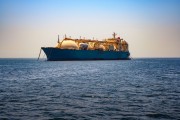Can B.C. have an LNG industry and still meet its climate targets? That’s one of the tricky questions that I and the other members of the Climate Leadership Team—a provincial advisory panel—wrestled with last year. While any LNG development makes it more challenging to reduce carbon pollution, it is possible to achieve this balance, but it would require significant changes to the way natural gas is produced and liquefied.
The only way to square the circle is for the province to have much stronger climate policies, including a return to annual increases in the carbon tax. Those policies would lead to less methane leaking from natural gas infrastructure and a switch from burning gas to using renewable energy.
Right now, those policies aren’t in place, which is why B.C.’s carbon pollution is rising and projected to continue rising. Whether B.C. gets back on track and regains its status as a climate leader will depend on the province’s forthcoming climate plan. If the plan isn’t strong enough, we shouldn’t approve any new projects that will make the problem worse, including Pacific NorthWest LNG.
—Matt Horne, B.C. associate director, Pembina Institute
(This letter to the editor originally appeared in Alaska Highway News on July 21, 2016.)





